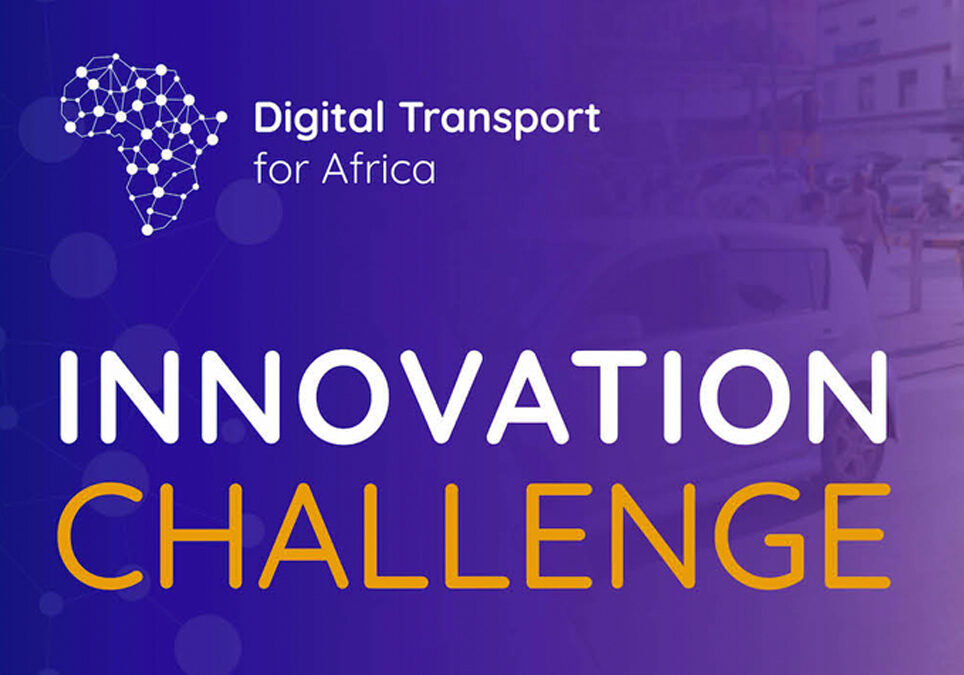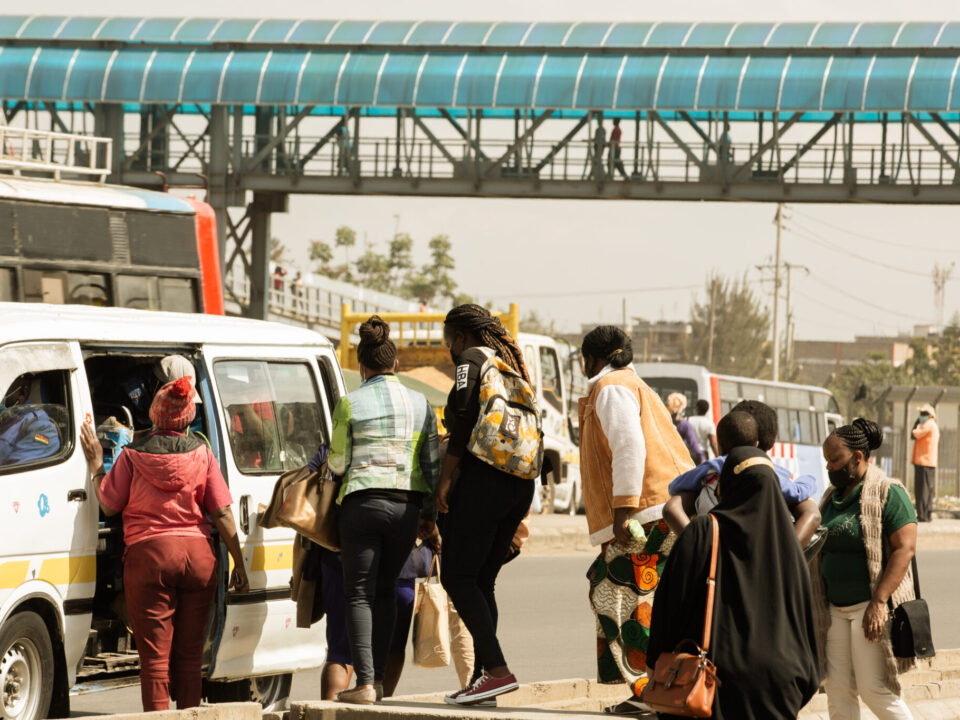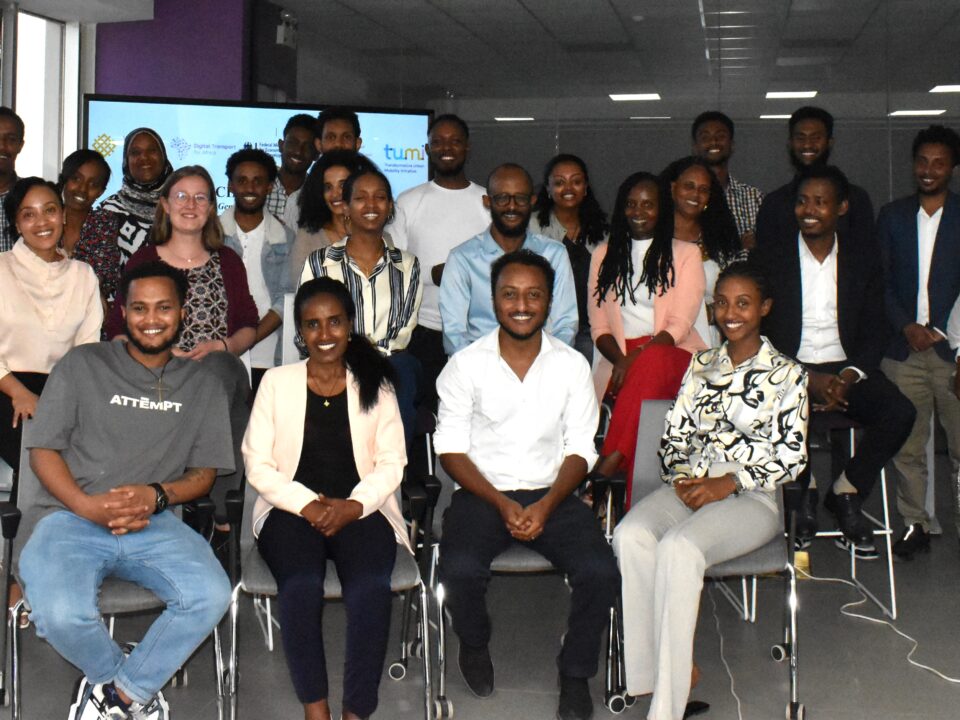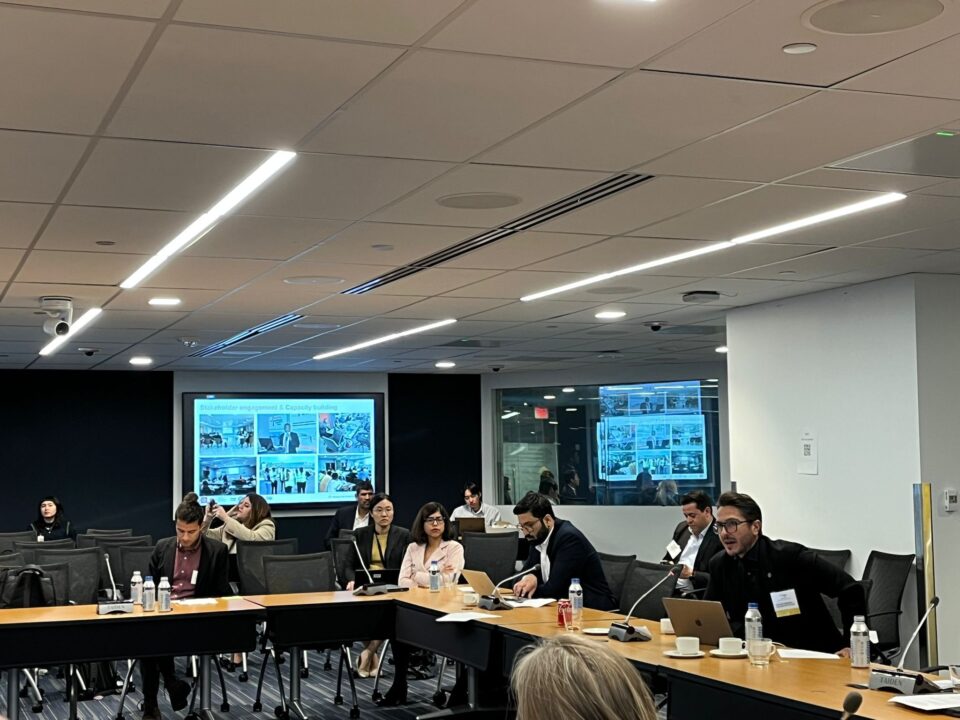
DT4A Innovation Challenge Updates: GoMetro
21 décembre 2023
DigitalTransport4Africa Newsletter: December 2023
2 janvier 2024DT4A launched the DT4A Innovation Challenge in December 2021 to spotlight and award innovative urban mobility mapping initiatives. The first four winners of the DT4A Innovation Challenge were chosen in June 2022 from more than 100 submissions. AddisMap (Ethiopia), Ewarren (Côte d’Ivoire) and GoMetro (South Africa) are now in the midst of a 12-month implementation period and telling their stories of impact across Africa.
Explore the remarkable journeys of the DT4A Innovation Challenge winners as they share their firsthand experiences, insights, and achievements in this exclusive Q&A interview. Gain valuable insights into the implementation and impact of their innovative ideas, including the challenges they faced and the remarkable outcomes they achieved. Additionally, hear from transport officials representing cities that have directly benefited from these innovations, such as Abidjan and Addis Ababa. Learn from their expertise and discover the transformative potential of their groundbreaking solutions.
Explore the remarkable journeys of the DT4A Innovation Challenge winners as they share their firsthand experiences, insights, and achievements in this exclusive Q&A interview. Gain valuable insights into the implementation and impact of their innovative ideas, including the challenges they faced and the remarkable outcomes they achieved. Additionally, hear from transport officials representing cities that have directly benefited from these innovations, such as Abidjan and Addis Ababa. Learn from their expertise and discover the transformative potential of their groundbreaking solutions.
Addis Ababa Transport Bureau (AATB)

Mohammed Hussen, Technical Advisor, Addis Ababa Transport Bureau (AATB)
Can you describe the current state of informal/popular public transport in Addis Ababa? What are the specific challenges associated with it, specifically focusing on transport data and digitalization?
Though formal public transport modes are also operating, the predominant public transport modes in Addis Ababa are the informal minibus taxis. In 2022, an estimated 1.43 million passengers (46%) were transported by informal minibus taxis, whereas an estimated 780,000 individuals (25%) were transported through formal bus transportation. Although the Addis Ababa City government is working to satisfy the increasing demand for transportation in the city, limited technology utilization and lack of digital transport data in the sector are still critical challenges. The absence of digital data in the informal taxi sector is, thus, inducing several challenges to the city’s transport system such as inefficient route planning, limited route enforcement, poor fare enforcement, and inefficient fuel subsidy controlling system.
In what ways have your city benefited from the DT4A initiative and the innovations implemented by AddisMap –the winner of the Innovation Challenge? Could you provide specific examples of impacts in sustainable mobility or urban transportation resulting from the initiative?
The vision of the Addis Ababa Transport Bureau (AATB) is to make sure that the Addis Ababa city has an affordable, safe, reliable, and environmentally friendly transportation system by 2030. Furthermore, improving the quality of the city’s public transportation network is one of the main strategic pillars of the AATB Transport Strategy. In this context, Addis Map—the winner of the DT4A innovation award—developed an open-source platform that provides accurate and up-to-date real-time information about public transportation in Addis Ababa. This will assist the Bureau in making well-informed decisions regarding planning matters about public transportation. Consequently, AddisMapTransit is working per the AATB’s vision and strategy, which aims to ensure reliable public transportation in Addis Ababa.
How does your city plan to utilize the data collected and solutions developed by AddisMap for enhancing sustainable mobility and urban planning?
The Addis Ababa Transport Bureau (AATB), in collaboration with AddisMap Transit, continues to collect digital public transport data, including both for formal and informal public transport modes. This cooperative effort to gather data on public transportation can also be applied to jointly utilizing the innovator’s solutions, as necessary. Therefore, the Bureau will work with AddisMap transit and other potential mobility innovators in the city to ensure data-driven public transportation planning.
From your perspective, what specific actions or reforms would you like to see from government institutions beyond your organization/department to better support the integration of sustainable mobility data into urban planning and decision-making processes? How can AATB play a more active role in driving positive change in the field of sustainable mobility?
The private sector tends to be more technologically advanced and innovative than the governmental sector when it comes to mobility and innovation. Governmental agencies and the commercial sector, especially those involved in the ITS and ICT industries, must collaborate to address mobility impediments. A cooperative effort involving several stakeholders, both private and public, is necessary to facilitate the incorporation of sustainable mobility data into urban planning and decision-making procedures. To effectively incorporate sustainable mobility data into urban planning and decision-making processes, authorities in the transport sector must particularly reform and focus on the following essential components: enhance digital data use and application, reform structure & key human resources, establish Research and Development center and increase technology utilization, and strengthen the legal environment. To promote sustainable mobility practices, it is also recommended that authorities engage in cooperative efforts to ensure shared inter-organizational plans and strategies.
Autorité de la Mobilité Urbaine dans le Grand Abidjan (AMUGA)

Sylviane FOFANA, Head of Observatory Department, AMUGA – Côte d’Ivoire
Can you describe the current state of informal/popular public transport in Abidjan? What are the specific challenges associated with it, specifically focusing on transport data and digitalization?
In Abidjan, Côte d’Ivoire, informal public transport, known as artisanal public transport, comprises approximately 70% of the transport sector. It includes traditional ferries (pinnaces), minibuses (called gbaka), communal and intercommunal taxis (called woro-woro). However, this sector faces significant challenges, particularly in terms of transport data and digitalization. The main challenge lies in its lack of formalization and adherence to standardized rules, making it difficult to collect reliable data. To address this, the government has initiated a reform to modernize the sector. The recent JMUR (Urban Mobility Days) organized by AMUGA in November 2022 brought together stakeholders to emphasize the importance of professionalizing the artisanal sector. The modernization efforts aim to improve the ease of data collection and monitoring in the transport system.
In what ways have your city benefited from the DT4A initiative and the innovations implemented by Ewarren –the winner of the Innovation Challenge? Could you provide specific examples of impacts in sustainable mobility or urban transportation resulting from the initiative?
The DT4A initiative has brought significant benefits to AMUGA and the city of Abidjan. One notable impact stem from the mapping activities carried out by Ewarren, the winner of the Innovation Challenge. Ewarren’s mapping focused on paratransit transport and has provided valuable insights. Following their success in the DT4A initiative, Ewarren continued their collaboration with AMUGA and embarked on several projects. A notable example is the design of a mobility application for the CAN23, which will enhance sustainable mobility during the event. Additionally, AMUGA and Ewarren are working together on projects such as centralized transport data management and road safety data management. These initiatives have demonstrated the potential of local innovation in transforming urban transportation and have paved the way for further collaborations.
How does your city plan to utilize the data collected and solutions developed by Ewarren for enhancing sustainable mobility and urban planning?
The city of Abidjan plans to utilize the data collected and solutions developed by Ewarren to enhance sustainable mobility and urban planning. Ewarren’s mapping activities have provided valuable insights into the informal public transport sector, informing future urban planning strategies. Collaboration between AMUGA and Ewarren includes ongoing projects such as designing a mobility application for the CAN23 event and centralizing transport data management. These initiatives aim to improve transport efficiency and develop data-driven urban planning processes. Abidjan seeks to enhance its understanding of transport patterns and develop sustainable urban planning strategies for a more informed and efficient transportation system.
From your perspective, what specific actions or reforms would you like to see from government institutions beyond your organization/department to better support the integration of sustainable mobility data into urban planning and decision-making processes? How can AMUGA play a more active role in driving positive change in the field of sustainable mobility?
To better support the integration of sustainable mobility data into urban planning and decision-making processes, it is crucial for government institutions to take specific actions and implement necessary reforms. One key aspect is providing both technical and financial support for innovation projects in the field of sustainable mobility. By investing in these projects, governments can ensure the availability of accurate and reliable data, which is essential for monitoring policies and measuring the effectiveness of initiatives. To emphasize the importance of data-driven decision-making, we can draw parallels with other areas where precise numbers are relied upon. For instance, to measure a company’s performance, we rely on its performance indicators (its numbers). Similarly, tracking key indicators enables us to measure an employee’s attendance or efficiency. This demonstrates that relying on precise numbers is essential for measuring the authenticity and effectiveness of any endeavor.
Furthermore, governments should prioritize the development of centralized systems for managing transport data. These systems would facilitate the collection, integration, and accessibility of all relevant data. By establishing such systems, governments can ensure that urban planning and decision-making processes are based on comprehensive and up-to-date information. By actively participating in these efforts and supporting the integration of sustainable mobility data, government institutions can play a more active role in driving positive change. This proactive approach will contribute to the development of sustainable mobility practices and pave the way for informed and effective urban planning and decision-making.
